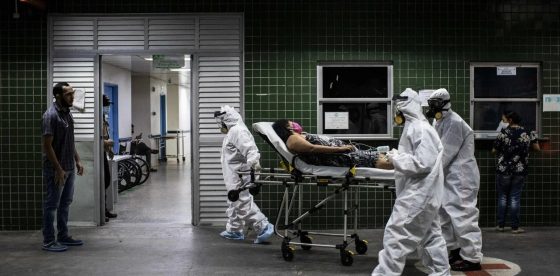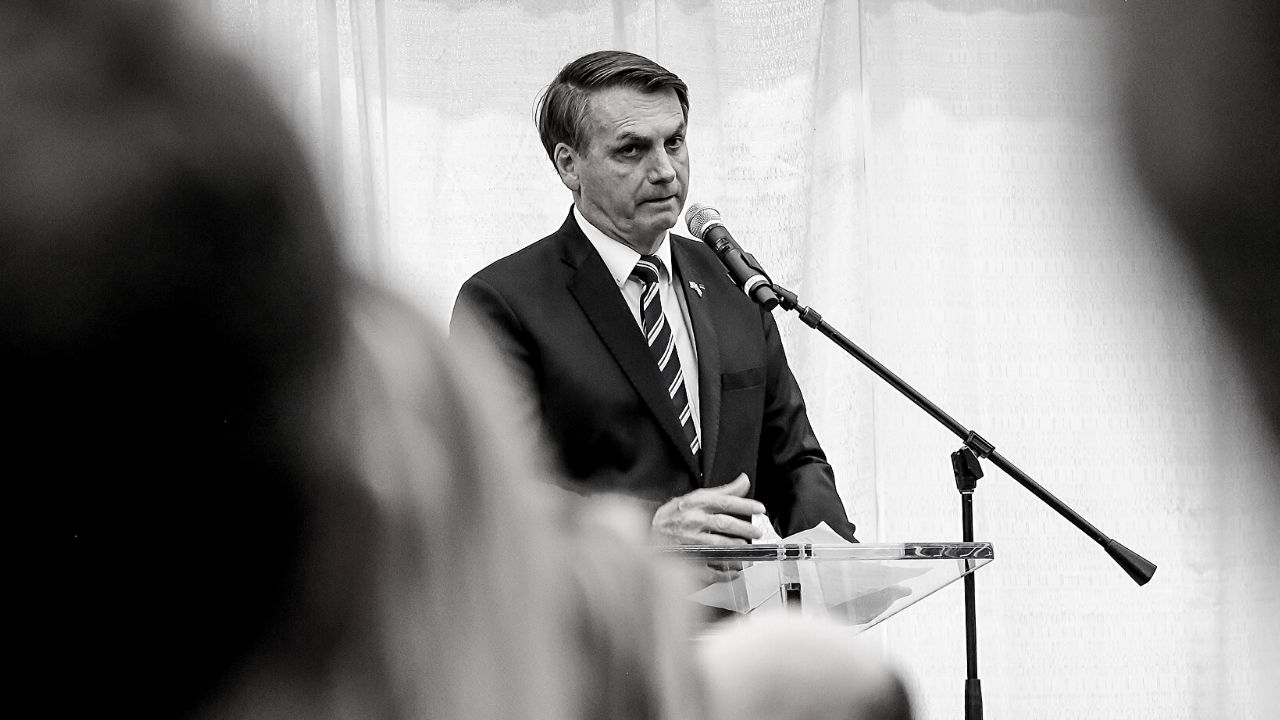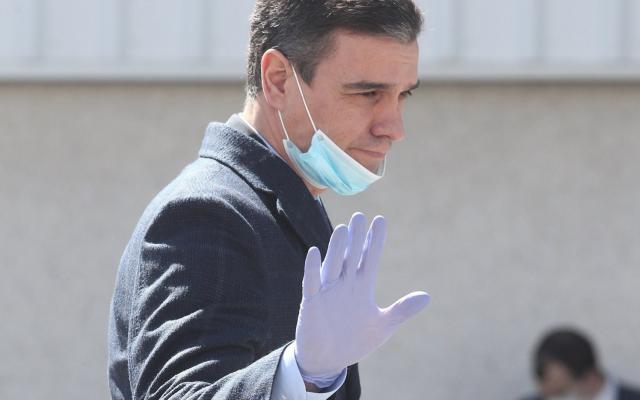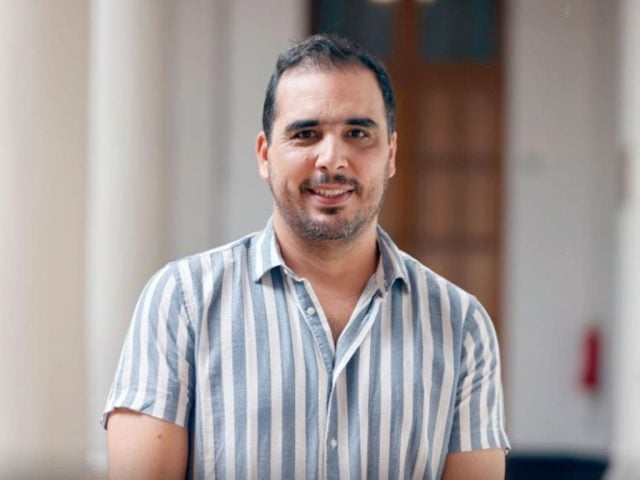Brazil has more than 200,000 infected with coronavirus and became the sixth largest focus of COVID-19 in the world, behind the United States, Spain, Russia, the United Kingdom and Italy.
According to the records of the Ministry of Health, the number of infected by the coronavirus reached 202,918, while the number of deceased stands at 13,993, but with great possibilities of increasing, since there are 2,000 deaths under investigation. With these alarming figures, the South American nation constitutes a danger to the rest of the countries in the region.
Sao Paulo remains the epicenter of the disease, with more than 54,000 positive cases and 4,315 deaths. The second state with the most infections is Ceará with 21,077 infections and 1,413 deaths. Meanwhile, Rio de Janeiro has the highest mortality rate, with 19,467 infected and 2,247 deaths.
The number of infected could also be much higher due to the high underreporting and the delay in carrying out the clinical tests.
Likewise, several studies carried out by Brazilian scientists «calculate the number of infections above one million», reported Clarín. In fact, only on Thursday, May 14, 13,944 new infections and 844 deaths were detected.
In this regard, the Ministry of Health reported this week that the fatality rate of coronavirus in the country is 6.9%. Meanwhile, the Institute for Health Metrics and Evaluation at the University of Washington warned that Brazil could accumulate about 90,000 deaths in August.
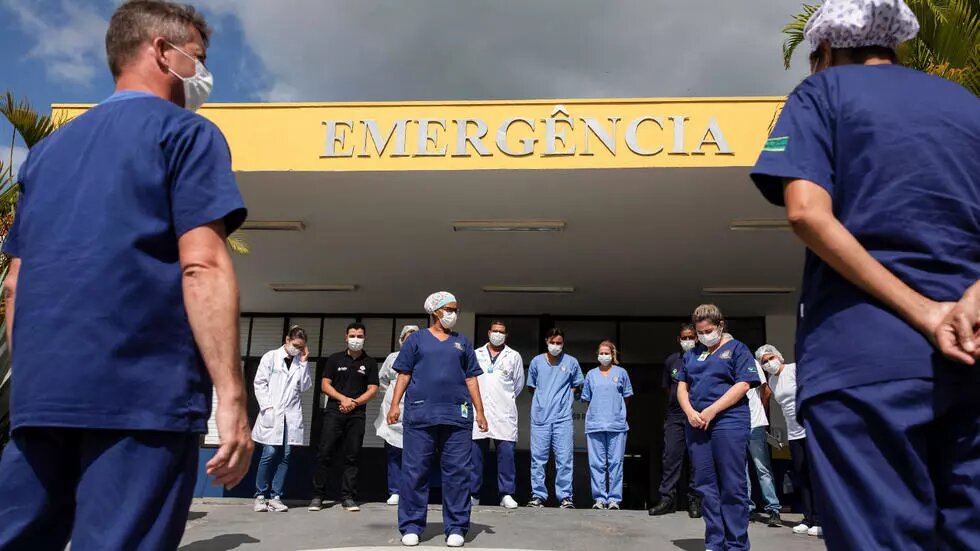
32,000 health workers infected
The critical situation in Brazil also affects workers in the health sector. According to official figures, almost 32,000 health professionals have contracted COVID-19 since the start of the outbreak.
Health authorities reported that 199,768 workers in the public health system presented symptoms of COVID-19, of which 31,790 had been confirmed positive for the disease, while another 53,677 were ruled out.
«Some 114,300 workers are still suspected cases and are still under investigation», the EFE agency reported.
The substitute secretary of Health Surveillance, Eduardo Macário, stated at a press conference that, regardless of whether or not it is a confirmed contagion, all health professionals who present any symptom of COVID-19 should be discharged to «prevent transmission in the hospital environment ”.
Health workers have denounced the lack of medical supplies and personal protective equipment (PPE) required to treat patients infected with coronavirus.
In statements to the Jornal Nacional newspaper, the head of the Federal Nursing Council (Cofen), Manoel Neri, denounced the lack of isolation of nurses, technicians and assistants who are part of the risk group; and raised the need that, in the absence of supplies, the country should assume the production of masks, protective glasses, gloves and aprons for health personnel who are on the front line.
Until 15 days ago, the Cofen had received more than 2,600 complaints from nurses, technicians and nursing assistants because of the lack, scarcity and restriction of different materials such as gloves, alcohol or surgical caps.
Many even denounced that they were asked to purchase protection materials and equipment by their own means.
According to Neri, Brazil should have prepared itself in advance for the pandemic, because now it is «reaping a very bitter fruit, both because of the number of deaths, which is already very high, and because of the number of professionals who are being contaminated and removed» from the health system.
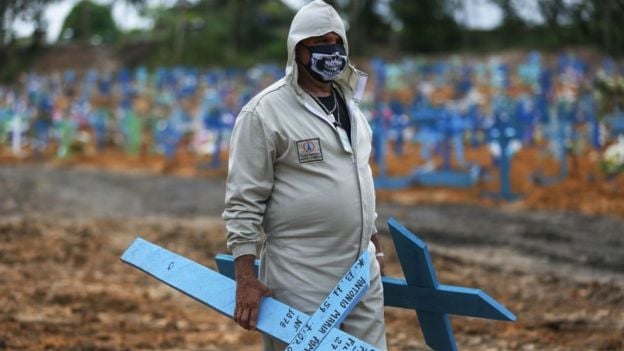
A danger to the region
With almost 14,000 deaths from coronavirus and the highest fatality rate in South America, Brazil is a danger to neighboring countries.
Governments in the region are alarmed at the lack of forceful measures by the Jair Bolsonaro administration and are concerned that Brazil, which shares a border with 10 countries, will harm their efforts in the fight against COVID-19.
Mario Abdo Benítez, president of Paraguay and an ally to Bolsonaro, closed his borders with Brazil when registering the first cases of coronavirus in March.
The Government sent the military to the border region to prevent the entry of cars and buses of Brazilian merchants and residents. Wire fences were also erected in the border city of Pedro Juan Caballero.
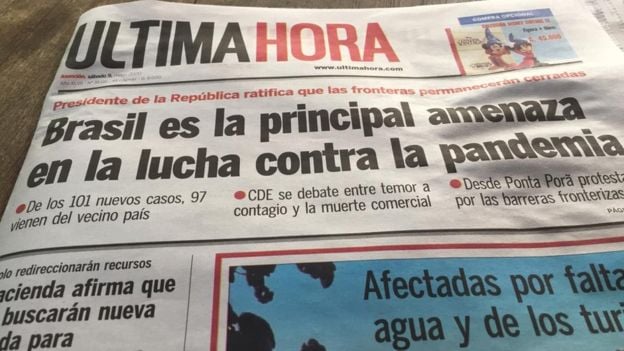
«The two governments, that of Paraguay and Brazil, have many affinities, but now our concern is the health of Paraguayans», said Juan Carlos Portillo Romero, deputy minister of Comprehensive Health Care and Social Welfare of Paraguay.
“Brazil is a concern for the number of cases, but we take all preventive measures. The cases of the disease in our country are imported from various places, but mainly from Brazil”, Portillo told BBC Brazil.
Meanwhile, Argentina closed almost all of its borders with Brazil and other countries. President Alberto Fernández declared that Brazil is a bad example in the fight against the coronavirus.
«Those who give priority to the economy will end up gathering dead in refrigerated trucks and burying bodies in mass graves», he said in clear reference to Bolsonaro.
In Uruguay, President Luis Alberto Lacalle Pou decided to increase the presence of troops in the border region with Brazil. While the Secretary of the Presidency, Álvaro Delgado, reported that the Government was «concerned» with the situation in some border towns.
Another president related to Bolsonaro is Colombian President Iván Duque, who on Tuesday announced that after evaluating the behavior of the coronavirus in the Amazonas department (bordering Brazil), he decided to tighten controls in order to contain the spread of the pandemic in that region of the country, including the militarization of the frontier city Leticia.
In Peru, the Regional Organization of Indigenous Peoples of the East warned in a statement about the vulnerability of indigenous communities on the border between Brazil and Colombia.
In Venezuela, which has one of the lowest rates of contagion with just 455 registered cases, President Nicolás Maduro chose to close the borders with Brazil and Colombia from the start of the outbreak.
Maduro warned that at the moment the threats to Venezuela are the foci of Colombia and Brazil, countries that face a «painfully impressive» situation, which has had an impact on the Venezuelan population that were living there, and who have been fleeing «xenophobia, the coronavirus and hunger».
For this reason, he called on governors, the Armed Forces and citizens to strengthen health security on the border, where the largest number of cases of coronavirus are being registered.
In addition, he indicated to the Venezuelan population that «we cannot let ourselves be infected», since Brazil is the epicenter of the pandemic in Latin America, while Colombia has a disaster in the handling of the virus and the people are dying in the streets.
«We are surrounded in the south by Brazil and in the west by Colombia. The number of times will not suffice. We have to take care of ourselves», said Maduro, quoted by Telesur.
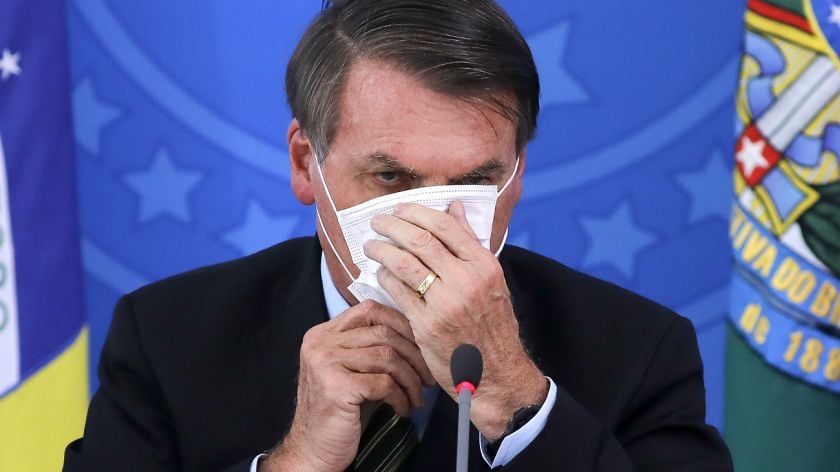
Bolsonaro washes his hands
Despite the dramatic situation his country is going through, Bolsonaro insists on minimizing the severity of the pandemic and promotes the anti-confinement, opposing the governors who have issued containment measures.
«We have to get out of the isolation or we will starve», said the president of the country that accounts for almost half of the infections in Latin America.
The far-right politician has tried to wash his hands of his responsibility for managing the pandemic. Days ago, he affirmed that he cannot «be held responsible» for the economic consequences of the crisis, since he «never approved» measures such as quarantines or the closing of shops and industries that some governors and mayors applied in the face of the rapid increase in infections.
However, he later went even further and decreed a provisional measure that prevents the criminal liability of public officials for measures taken directly or indirectly in the context of the coronavirus health emergency.
The most serious issue is that the health authorities do not have any forecast on the date when the expansion of COVID-19 in the country will stabilize or decrease.
The undersecretary of Health Surveillance of the Ministry of Health, Eduardo Macário, indicated that «there is no prospect of stabilization or decrease of the curve at this time».
Meanwhile, specialists cited by Euronews warned that if the current contagion curve remains at these high levels, Brazil, with more than 200 million inhabitants, could become the focus of the global pandemic next June.
